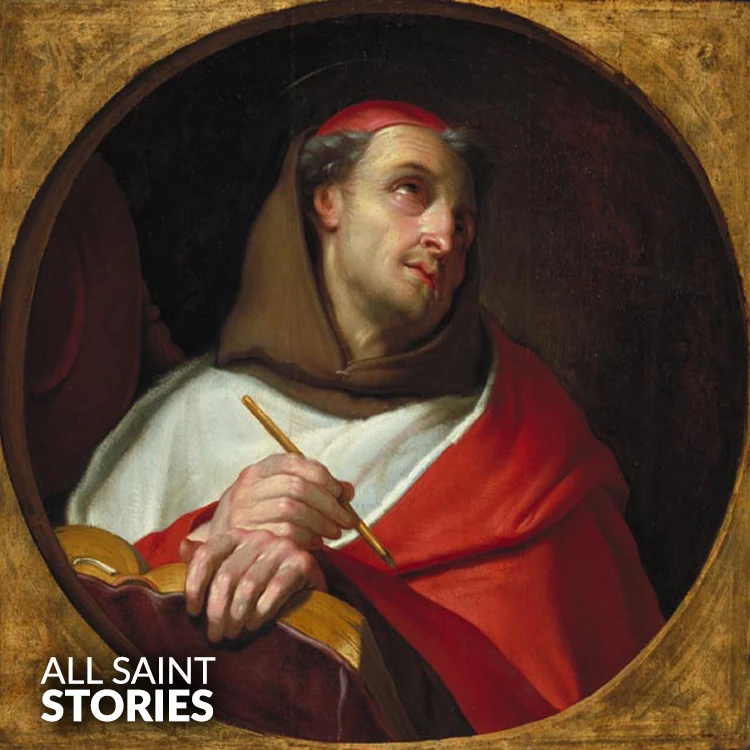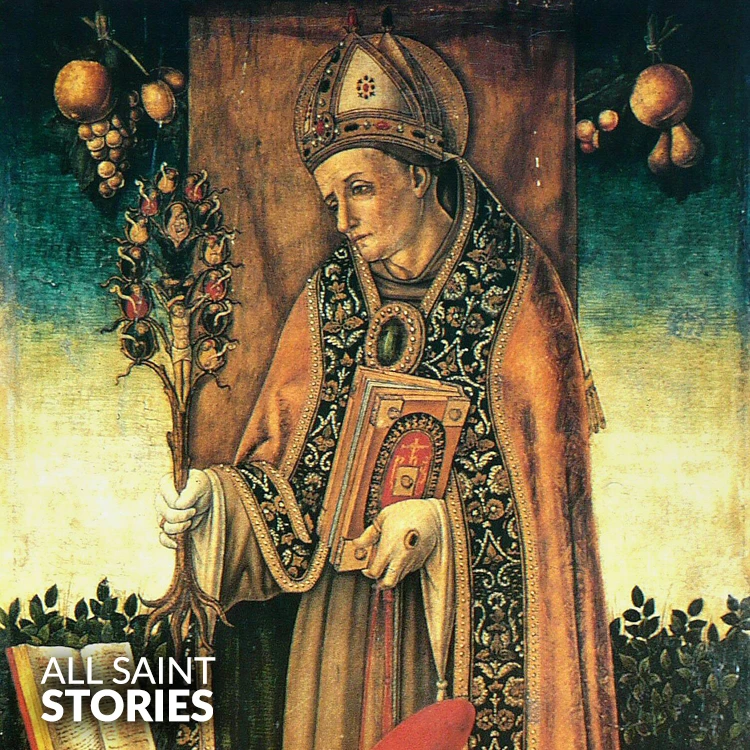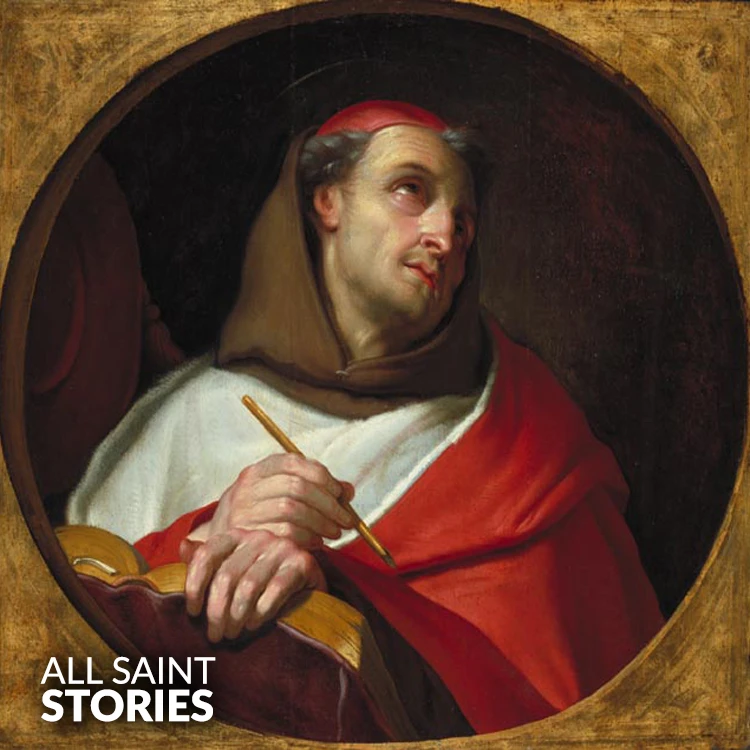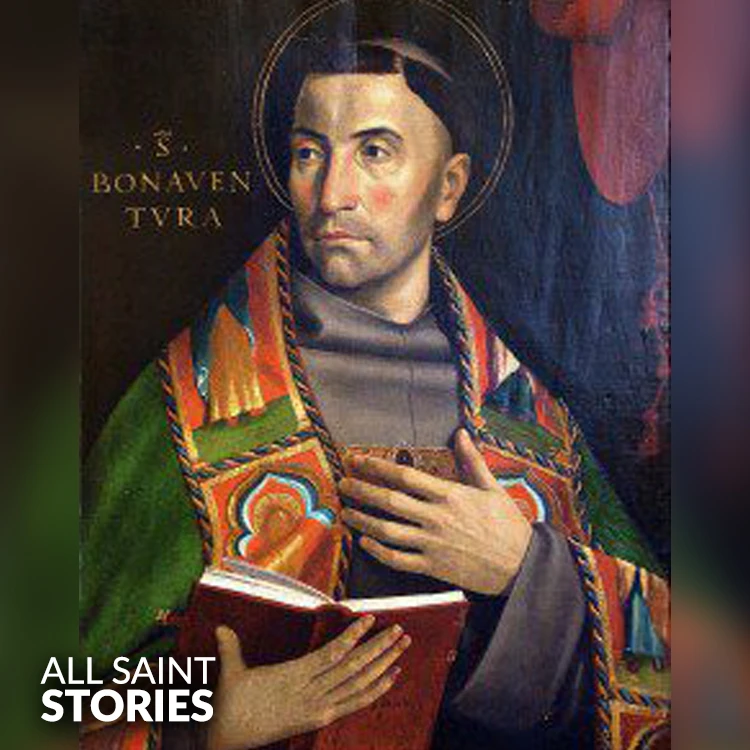Lord Jesus, as God's Spirit came down and rested upon you, may the same Spirit rest upon us, bestowing his sevenfold gifts. First, grant us the gift of understanding, by which your precepts may enlighten our minds. Second, grant us counsel, by which we may follow in your footsteps on the path of righteousness. Third, grant us courage, by which we may ward off the Enemy's attacks. Fourth, grant us knowledge, by which we can distinguish good from evil. Fifth, grant us piety, by which we may acquire compassionate hearts. Sixth, grant us fear, by which we may draw back from evil and submit to what is good. Seventh, grant us wisdom, that we may taste fully the life-giving sweetness of your love.
ST.BONAVENTURE
ST.BONAVENTURE

St. Bonaventure, born Giovanni di Fidanza in 1221 in Civita di Bagnoregio, Italy, was a Franciscan theologian, philosopher, and Cardinal of the Catholic Church. He is known for his deep integration of faith and reason, which shaped medieval Christian thought. As a young child, he was gravely ill but was reportedly cured through the intercession of St. Francis of Assisi, which inspired his devotion to the Franciscan Order. He studied at the University of Paris under notable scholars like Alexander of Hales and later became a master of theology. He played a crucial role in the Franciscan Order, guiding it with wisdom and ensuring its alignment with the Church's teachings.
Early Life and Education
St. Bonaventure was born in 1221 in Civita di Bagnoregio, a town near Viterbo in central Italy. His given name was Giovanni di Fidanza. While little is known about his early years, it is said that as a child, he suffered from a severe illness that threatened his life. His mother, Maria Ritella, prayed fervently to St. Francis of Assisi for her son’s healing. Miraculously, he recovered, and this event was believed to be through the intercession of St. Francis. Out of gratitude and devotion, Giovanni later joined the Franciscan Order, taking the name Bonaventure.
In 1243, Bonaventure entered the Franciscan Order and began studying theology at the University of Paris, a prestigious institution of the time. He was likely a student of Alexander of Hales and later of John of Rochelle. His education was rooted in scholastic philosophy, with influences from great thinkers such as Aristotle, Augustine of Hippo, and St. Francis of Assisi. By 1253, he had gained recognition for his intellectual abilities and was appointed as a professor of theology at the University of Paris.
Theologian and Teacher
Bonaventure’s theological contributions were vast and influential. He was known for his ability to synthesize various strands of theological thought into a cohesive system. His most famous work, Commentary on the Sentences of Peter Lombard, remains a cornerstone of medieval theology. This book explored fundamental Christian doctrines and integrated philosophy and faith in a balanced manner.
One of Bonaventure’s most important philosophical contributions was his emphasis on the mystical knowledge of God. He believed that human understanding begins with faith and is perfected through divine illumination. According to him, true wisdom is not just intellectual but also experiential—gained through prayer and mystical union with God.
In 1257, he was granted the title of Master of Theology alongside another great thinker of the time, St. Thomas Aquinas. Despite their different approaches—Aquinas focusing on Aristotelian logic and Bonaventure on Augustinian mysticism—the two theologians held each other in high regard.
Leader of the Franciscan Order
Bonaventure was elected Minister General of the Franciscan Order in 1257, a position he held for 17 years. During this time, the order was facing internal divisions. Some Franciscan friars wanted a stricter interpretation of St. Francis’ rule of poverty, while others preferred a more lenient approach. Bonaventure worked to balance these perspectives, ensuring that the Franciscan Order remained united.
One of his major contributions as Minister General was writing the official biography of St. Francis of Assisi, Legenda Major, which became the authoritative account of St. Francis’ life. He depicted St. Francis not just as a founder of the order but as a true embodiment of Christ’s teachings. His biography was so highly regarded that it became the standard text for the order, and all previous biographies were suppressed in favor of his account.
Elevation to Cardinal and Role in the Church
Due to his influence and wisdom, Bonaventure was chosen by Pope Gregory X to serve as Cardinal-Bishop of Albano in 1273. His role was not just honorary; he was actively involved in Church affairs and was invited to participate in the Second Council of Lyon in 1274. The council’s primary objective was to reunite the Eastern Orthodox and Roman Catholic Churches, which had been in schism since 1054.
Bonaventure played a key role in drafting the proposals for reconciliation. His theological insights helped bridge the doctrinal differences between the two traditions. Unfortunately, he died suddenly on July 15, 1274, before the council could conclude. Some historical sources suggest he may have been poisoned, though this remains speculation.
Miracles and Canonization
Following his death, Bonaventure’s reputation for holiness grew. His teachings continued to inspire theologians and religious scholars. In 1434, his remains were transferred to a more suitable location, and it was discovered that his head was incorrupt. This miracle further solidified his legacy. However, in 1562, during the religious wars in France, Protestant Huguenots desecrated his remains, burning them in a public square.
Despite this tragic event, his influence on Catholic thought remained intact. He was canonized as a saint in 1482 by Pope Sixtus IV. Later, in 1588, Pope Sixtus V declared him a Doctor of the Church, a title reserved for theologians whose writings have had a significant impact on Christian doctrine.
Legacy and Influence
Bonaventure’s works continue to be studied by theologians and philosophers today. His synthesis of faith and reason laid the foundation for later Catholic teachings. His writings emphasize the mystical journey of the soul toward God, making him an important figure in Christian spirituality.
His feast day is celebrated on July 15 in both the Roman Catholic Church and the Anglican Communion. He remains the patron saint of bowel disorders, a title given due to a historical association with digestive ailments.
Even centuries after his death, Bonaventure’s teachings inspire Christians seeking a deeper understanding of their faith. His wisdom, humility, and devotion to the Franciscan Order solidify his place as one of the greatest saints and theologians of the medieval era.
Video Not Found
The information on this website is compiled from various trusted sources. While we aim for accuracy, some details may be incomplete or contain discrepancies.
If you notice any errors or have additional information about this saint, please use the form on the left to share your suggestions. Your input helps us improve and maintain reliable content for everyone.
All submissions are reviewed carefully, and your personal details will remain confidential. Thank you for contributing to the accuracy and value of this resource.
Credits & Acknowledgments
- Anudina Visudhar (Malayalam) – Life of Saints for Everyday
by Msgr. Thomas Moothedan, M.A., D.D. - Saint Companions for Each Day
by A. J. M. Mausolfe & J. K. Mausolfe - US Catholic (Faith in Real Life) – Informational articles
- Wikipedia – General reference content and images
- Anastpaul.com – Saint images and reflections
- Pravachaka Sabdam (Malayalam) – Saint-related content and insights
We sincerely thank these authors and platforms for their valuable contributions. If we have unintentionally missed any attribution, please notify us, and we will make the correction promptly.
If you have any suggestion about ST.BONAVENTURE
Your suggestion will help improve the information about this saint. Your details will not be disclosed anywhere.
© 2026 Copyright @ www.allsaintstories.com





 English
English
 Italian
Italian
 French
French
 Spanish
Spanish
 Malayalam
Malayalam
 Russian
Russian
 Korean
Korean
 Sinhala
Sinhala
 Japanese
Japanese
 Arabic
Arabic
 Portuguese
Portuguese
 Bantu
Bantu
 Greek
Greek
 German
German
 Dutch
Dutch
 Filipino
Filipino